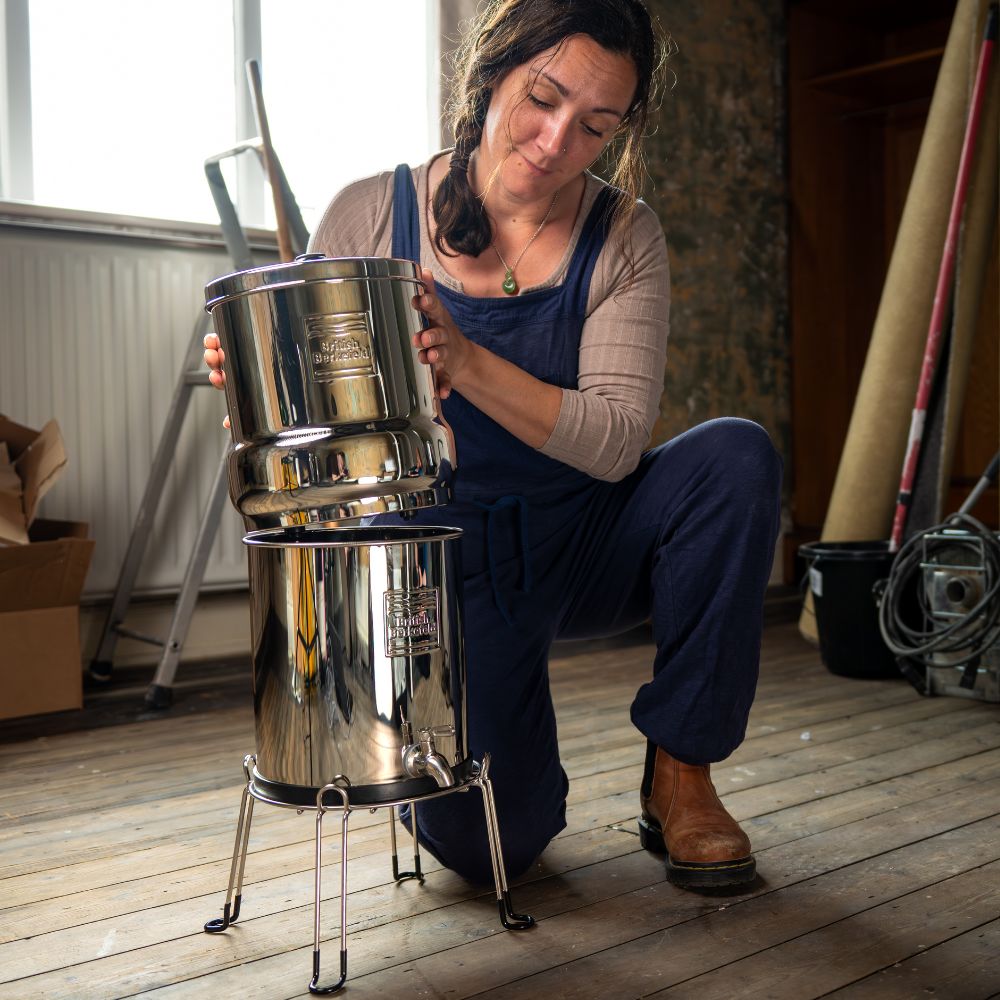
What’s the Difference Between the Ultra Sterasyl® & Ultra Fluoride Water Filters?
Choosing the right water filter isn’t just about picking the first product on the shelf; it’s about understanding what you want to keep in your water and, more importantly, what you want to leave out. Our range of water filters are designed to not only meet the needs of your unique lifestyle, but to also ensure that you can trust the performance of the system and have full confidence in the water that comes out.
If you are looking to purchase, or already have, a British Berkefeld gravity system, you will notice that Doulton supplies two different types of filters: Ultra Sterasyl® and Ultra Fluoride. Each filter has specialties of water filtration, and which you choose depends on your needs.

The Ultra Sterasyl® Filter
When it comes to eliminating the wide range of organic contaminants that frequently hide in your tap water, Ultra Sterasyl is a formidable adversary. Its proficiency resides in its capacity to significantly reduce pesticides, medicines, and several other trace organics that may be present.. If you’re worried about the chemicals from agricultural run-off or industrial waste ending up in your glass, this is the filter for you.
- Pesticides and Pharmaceuticals: Ultra Sterasyl has impressive efficiency, removing over 95% of certain trace organics, and achieving over 99 % filtration for compounds like lindane, atrazine, and benzene. These contaminants can be notoriously tricky to remove, but this filter deals with them.
- Reduce Chlorine: Does your water taste like a swimming pool? Ultra Sterasyl wipes out 99% of chlorine, improving both the taste and the odour of your water. This makes it a favourite for households aiming for better-tasting tap water.
For consumers focused on ridding their water of organic pollutants and chlorine, the Ultra Sterasyl may be their best solution. It’s also a cost-effective choice for those who aren’t particularly worried about fluoride or heavy metals.

The Ultra Fluoride Filter
If fluoride or heavy metals in your water worries you, Ultra Fluoride is the best solution for you. This filter is designed to reduce fluoride levels while also tackling a variety of heavy metals that can sometimes seep into municipal water supplies.
- Fluoride Removal: Ultra Fluoride’s has the ability to reduce fluoride content in your water. Fluoride is often added to tap water to promote dental health, but some people prefer to limit their intake. Ultra Fluoride will help you achieve a reduction in Fluoride.
- Heavy Metal Filtration: Ultra Fluoride removes a range of heavy metals, including mercury (86.4%), arsenic (97.4%), and chromium (99.4%), among others. These contaminants, though less common, can pose health risks when present, and this filter effectively reduces them to safer levels.
- Reduce Chlorine: Just like the Ultra Sterasyl filter, the Ultra Fluoride reduces the amount of chlorine in your water by up to 99%.
The Ultra Fluoride’s main advantage is its enhanced carbon media, which boosts its ability to target heavy metals. However, this same media hasn’t been tested for removing pharmaceuticals or trace organics, which means you’ll need to weigh your priorities carefully.
Lifespan
Both the Ultra Sterasyl and Ultra Fluoride filters are recommended to be replaced every six months. This ensures that both filters maintain optimal performance over time, giving you consistent, high-quality water for the duration of their use. If you notice a decrease in flow rate, or water quality before this time frame, simply clean the filters with water and an abrasive cloth. If you still find that there are issues, it may be time to replace. However, this also depends on how much you use your system.
Which Filter Should You Choose?
The choice between Ultra Sterasyl and Ultra Fluoride comes down to what matters most to you.
- Best for Organic Contaminants: If your main concern is lead & organic chemicals like pesticides and pharmaceuticals, along with chlorine, the Ultra Sterasyl is the best choice.
- Best for Heavy Metals and Fluoride: If reducing fluoride and heavy metal is your concern, the Ultra Fluoride filter is for you. Its advanced carbon media ensures excellent filtration of these contaminants, making it a robust choice for households concerned about these elements in their water.
However, there’s always a trade-off. Ultra Fluoride’s enhanced carbon media is brilliant for tackling fluoride and metals but hasn’t been tested for pharmaceuticals or other organic compounds. So, if fluoride isn’t a concern for you, you may be better off sticking with Ultra Sterasyl.
What’s best for you?
There’s no universal answer when it comes to choosing between the Ultra Sterasyl and Ultra Fluoride filters - only the answer that’s right for your household and lifestyle.
If you’re more concerned about organic contaminants and chlorine, then the Ultra Sterasyl is the better option for your needs. However, if fluoride and heavy metals are what keep you up at night, Ultra Fluoride is your best bet.
Whatever your choice, you can rest assured that Doulton’s filters are designed to give you cleaner, better water every time you turn on the tap. And as always, if you need a little extra guidance of have any additional questions please reach out to our customer service team by emailing: filtersales@doulton.com
Ready to make your choice?
Vendor: British Berkefeld
British Berkefeld® Ultra Sterasyl® (8674)
Vendor: British Berkefeld
British Berkefeld® Ultra Fluoride (8B76)
Glossary
Pharmaceuticals
Pharmaceuticals
Refers to substances used in the production of medications, which can sometimes find their way into water supplies.
Pesticides
Pesticides
Chemicals used to kill pests in agriculture; these can contaminate water through run-off from fields.
Free Chlorine
Free Chlorine
The form of chlorine found in water that hasn't yet reacted with other substances; often added to water as a disinfectant but can affect taste and smell.
Fluoride
Fluoride
A naturally occurring mineral sometimes added to public water supplies to prevent tooth decay, though some prefer to limit their exposure.
Heavy Metals
Heavy Metals
Metals like mercury, arsenic, and lead, which can be harmful if present in water at high levels.
Carbon Media
Carbon Media
A material used in filters that captures contaminants through adsorption, widely used for reducing heavy metals and certain chemicals.

Explore the British Berkefeld range
Now we've explained the difference between the Ultra Sterasyl and Ultra Fluoride filters available in our British Berkefeld gravity cans, you can make an informed choice about which one suits your needs the best.






